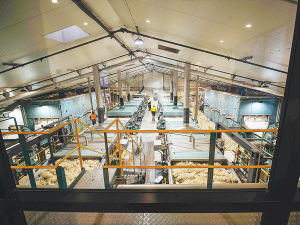The world's largest wool scouring facility, WoolWorks Awatoto plant in Napier, is back operating at full capacity.
This follows a $50 million rebuild due to damage caused by Cyclone Gabrielle in February last year.
The cyclone sent twometre high flood waters and silt pouring into the plant, causing major damage to the building, electrical systems, drainage and water infrastructure. A large amount of equipment, including the entire wool sorting operation and scour feed, was destroyed.
WoolWorks president Nigel Hales says Awatoto is the largest wool scouring plant in the country and a very important resource for farmers, the wool sector and the region.
“This re-opening highlights our commitment to New Zealand wool growers, the wool industry, and more broadly the primary sector. It also ensures continued employment for people in the region and ongoing investment at a time when the local and national economy is experiencing headwinds.
“We know wool growers are under pressure due to the challenging wool prices, however we absolutely believe there is a long-term future for wool
“We are passionate and committed to wool and believe that our ongoing investment in research and development, processing and manufacturing partnerships will support this unique and special fibre to become more widely accepted and sought after as the world seeks solutions to material problems and makes a commitment to sustainability,” says Hales.
The rebuild has also included a strong focus on future proofing. All main electrical boards are now located over three metres in height, with a 120 minute fire protection rating and, in some cases, to a force 10 earthquake proof standard.
WoolWorks has an established decarbonisation programme to reduce its emissions and future projects for the site include electricity generation from solar, micro wind turbines and a micro hydro electro generation unit.
Processing annually up to 107 million greasy kilograms of wool, Wool- Works is the largest early-stage wool processor in the world.
While the Napier plant was out of action, Wool- Works’ auxiliary site in nearby Clive, stepped up operations, operating 24/7 while North Island wool was also transported to WoolWorks South Island mega-site in Washdyke, Timaru.
Hales thanked shareholders, customers, the Ministry for Primary Industries, contractors and staff for their unwavering support.
“This was a challenging situation for the entire industry and we did all we could to utilise all available capacity across the company to keep the flow of wool moving through our available scouring plants.
“With over 85% of the wool we process being exported, we’re supporting logistics and seafreight companies, their people and service providers in and around the Hawke’s Bay and Canterbury regions.”
The company employs 150 people across a wide range of critical operational, technical, engineering, administrative and management roles.



















